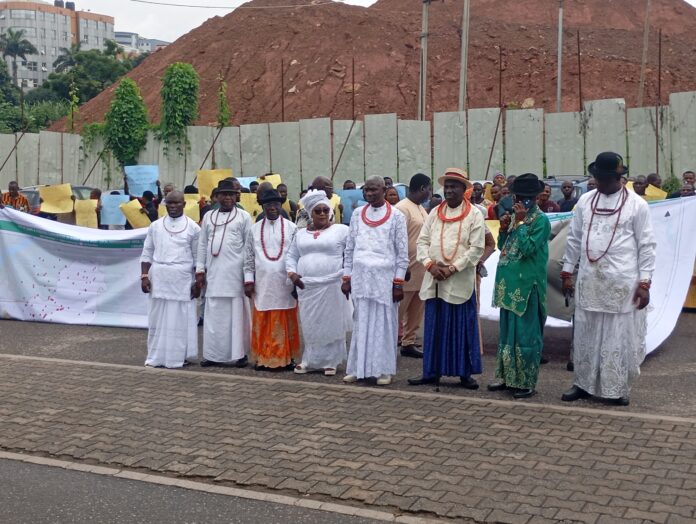WARRI: The Independent National Electoral Commission (INEC) has assured stakeholders in Delta State’s Warri Federal Constituency that it will act on complaints surrounding the delayed implementation of the Supreme Court-ordered delineation of wards and polling units.
This followed a protest on Tuesday in Abuja by Ijaw and Urhobo natives, who accused INEC of using outdated ward arrangements for the ongoing Continuous Voter Registration (CVR) exercise in Warri North, Warri South, and Warri South-West local councils.
Carrying placards with bold inscriptions, the demonstrators demanded the immediate release and enforcement of the delineation report, which had been presented to the three ethnic nationalities of Warri Ijaw, Itsekiri, and Urhobo earlier this year in Asaba.
The delineation exercise, mandated by a 2022 Supreme Court judgment, restructured the wards and polling units across the constituency.
According to the report, in Warri North, Ijaw secured 10 wards while Itsekiri retained eight; in Warri South-West, Ijaw got 15 wards while Itsekiri held four; and in Warri South, the Urhobo and Itsekiri received nine and eight wards respectively, compared to three for the Ijaw.
Speaking for the protesters, Chief David Reje said INEC’s decision to conduct the CVR using a defunct and illegal arrangement undermined both constitutional guarantees and the Supreme Court’s directive.
Our patience and cooperation are being taken for granted. You are setting machinery in place to disenfranchise us from future elections. This is an affront to the judiciary and to our democratic rights, Reje declared.
He vowed that the protesters would sustain peaceful demonstrations at INEC headquarters until their demands were met, warning that the growing frustration in the constituency could spiral out of control if not urgently addressed.
INEC National Commissioner, Prof. Abdullahi Abdu Zuru, while addressing the group, assured them that the commission would not allow any Nigerian to be disenfranchised.
I have listened carefully, and I will tender this document to the commission. There is no intention whatsoever to disenfranchise anybody.
It is our responsibility to ensure that every Nigerian is given the right to participate, and we will not fail in that duty, Zuru said.
While the Ijaw and Urhobo protested in Abuja, the Itsekiri have expressed their own reservations about the delineation outcome.
Leaders of the ethnic group argue that the allocation of wards, particularly in Warri South-West where they were given only four compared to the Ijaw’s 15, does not reflect their historical presence and political significance in the area.
Some Itsekiri elders contend that the delineation tilted heavily in favor of their Ijaw counterparts, and they fear the imbalance could weaken their voice in local governance.
Chief Edward Omagbemi, an Itsekiri community leader, stressed that fairness must guide INEC’s implementation.
We support the Supreme Court’s judgment and the rule of law, but equity must prevail. The Itsekiri have been key stakeholders in Warri’s development for decades.
Any delineation that drastically diminishes our political space will not foster peace or inclusiveness,” he said.
Another Itsekiri youth leader, speaking on condition of anonymity, warned that ignoring their concerns could stoke fresh tensions among the three ethnic nationalities.
He urged INEC to consult widely and ensure that no group feels shortchanged.
The unfolding dispute underscores the delicate balance of ethnic interests in Warri, a region with a long history of contestation over land, resources, and political representation.
While Ijaw and Urhobo groups are pressing for speedy implementation of the delineation, the Itsekiri insist that the process must be fair and not leave them politically marginalized.
Observers say INEC’s next steps will be crucial in determining whether the Supreme Court-ordered delineation strengthens democracy in Warri Federal Constituency or triggers fresh waves of ethnic distrust.



